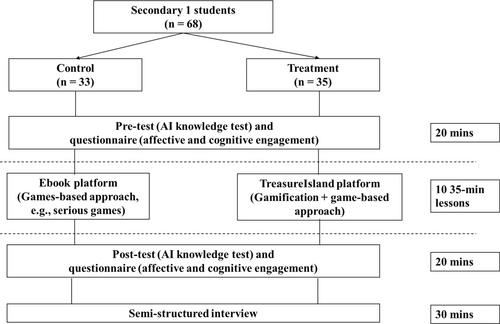As the significance of artificial intelligence (AI) continues to increase, there is a need for effective scaffolding and support for novice learners. Educators have encountered challenges in effectively scaffolding novice learners AI concepts, and providing appropriate motivational support. Research evidence has shown the potential of game-based approaches to fostering secondary school students' AI literacy and motivation to learn AI.
This study developed an online platform TreasureIsland to gamify ebooks and investigated whether and how students playing with it can effectively enhance their AI literacy. This study aims to contribute an empirical and theoretical basis for AI literacy education and promote the use of gamification that would be broadly applied in other schools.
A quasi-experiment was conducted to evaluate the effects of the proposed gamified approach, which included a control group using an ebook with playful resources. To triangulate the quantitative results obtained from the pre and post-test, focus group interviews were also conducted.
The platform was effective in improving students' motivation, self-efficacy, career interest, and understanding of AI concepts and ethics, but did not enhance their confidence of using AI, and high cognition of applying, evaluating and creating AI. TreasureIsland players demonstrated significant improvement in all affective and cognitive domains, except for the ability to apply, evaluate, and create AI. Interviews revealed that the gamified approach could promote students' AI literacy by adhering to guidelines, including (1) creating a competitive and motivating learning environment through game mechanics, (2) providing scaffolding modules and feedback, and (3) visualising complex AI concepts via simulations. Feedback collected from the study suggested adding pedagogical elements such as flipped classrooms and project-based learning in future research to improve the instructional design, and enable students to reach a higher level of cognition.
This study concludes that the use of gamification can provide affective and cognitive support and an enjoyable experience for fostering learners' AI literacy. It helps instructional designers and teachers enrich the pedagogical knowledge related to gamified platform and AI literacy.



